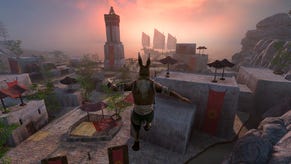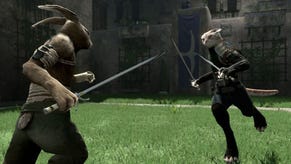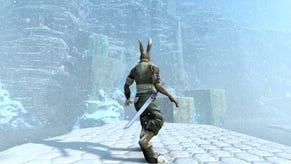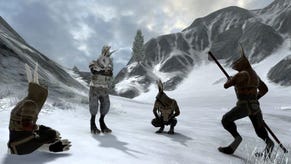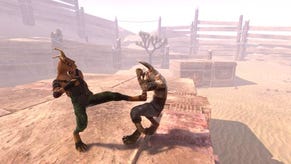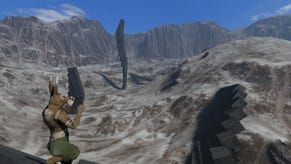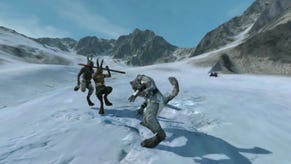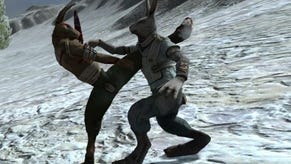Bunny Brawler: Wolfire Talk Overgrowth
It's a Thursday afternoon, and that means it's time to talk about cute animals kicking each other to death. We haven't covered upcoming indie action game Overgrowth much on RPS, which is a sad side-effect of its much-adored precursor Lugaru arriving before the Hivemind had coalesced into being. Let's correct that now, as it's hard to imagine you lot wouldn't be interested in a videogame about a rabbit roundhouse-kicking wolves. I had a quick natter with Aubrey Serr, Wolfire's lead artist and John Graham, Wolfire's self-proclaimed coffee operations officer, about what Overgrowth is, where it's at and the highs and low of self-funded development. It's entirely possible that some, all or none of these were dressed as kung-fu rabbits at the time.
Before we begin, here's a sense of what Overgrowth is/will be:
And now, words.
RPS: As we've been a little lax in covering Overgrowth to date, some of our delightful readers may not be aware of it. Please, tell 'em why they should care and what this strange and hopefully wonderful animal cruelty-based action game is...
Aubrey: PC games are seeing fewer and fewer big releases, especially from American developers. I miss games made for the mouse and games that are easy to mod. I don't want to see PC games become marginalized. People who care about these things will probably like Overgrowth.
John: Overgrowth is what happens when you mix one cup of Assassin's Creed with a seasoning of Redwall, add a pinch of Donnie Darko and stir it around with a broadsword. Following the tradition from Lugaru, our goal is to really force players to come up with their own survival combat strategies and tap into their primal kill or be killed instincts.
Aubrey: Overgrowth is not going to have gameplay oriented around hiding behind boxes while your health regenerates. It is not going to have brainless AI that waits for your overpowered character to easily dispatch them. It is not going to make you walk down narrow pre-determined paths while the game pretends to be a movie.
RPS: What are the key changes/improvements from Lugaru?
Aubrey: One of the things we are interested in is improving gameplay ideas from older games that were never fully explored. Oni was one of the core inspirations for Lugaru, and we are planning to experiment and refine things even more with Overgrowth. Blocking and grabbing will be added, as well as a totally revised set of moves which should result in a more balanced and tactical gameplay experience.
John: Remember, Lugaru was made 6 years ago by our fearless leader David Rosen as a lone high schooler. David has since graduated from college and now leads a 4-man team. We have spent that past year building ourselves a brand new, cutting edge engine that will allow us to revisit the Lugaru universe in much greater detail. Additionally, all the editor tools we've built over the past year to enhance our level creation process are getting bundled directly with the game and some fans have already started using the weekly alphas to make their own custom models (like the whale man), construct their own cities and create their own custom animations.
RPS: How technical a fighting game will it be? If you're someone who struggles at (or can't be bothered to learn), say, Street Fighter IV, are you going to get on with this?
Aubrey: If you like games with a lot of complex controller motions and 100 hit combo chains then Overgrowth is probably not the game for you. Like the Lugaru interface, Overgrowth is designed around the mouse, and it only uses a few buttons. The moves are context sensitive, and so there are still many attack options but they don't require you to memorize a list of moves.
John: Like Aubrey says, rather than allowing players to button mash or memorize arbitrary combos, we want them to be able to think their way through their fights. I recommend trying the free Lugaru demo and giving it a whirl to get a feel for the basic foundation that Overgrowth is inheriting.
RPS: Textbook question, but always interesting: was Lugaru made with an expectancy to go big and ultimately commercial, or is it a strange and wonderful surprise to be in this situation?
John: Even though Lugaru was only one of David's high school hobby-projects, its organic success was not a complete surprise considering the care and effort he put into it. After all, Lugaru was one of the first indie titles to really celebrate ragdoll physics and integrate them into a melee combat system as a core game mechanic. After Lugaru's successful launch, David began receiving recruitment offers from big companies like Crytek and Blizzard but turned them down to go to college. He came extremely close to releasing a sequel to Lugaru complete with realistic lighting, grass shading and procedural animations but just didn't have time to complete it with his demanding course load. Upon graduating however, he decided it was time to assemble a team and bootstrap his own company with the proceeds. It is nice to be self-funded because we are free to make a game we actually want to make and can prioritize fun gameplay over profit maximization.
RPS: Where exactly are you at, in terms of the development cycle? That release date remains ever-mysterious... And what have been the major obstacles to date?
Aubrey: We are working on core gameplay and engine technology still. Some bits are mostly complete, like our built-in level editor and our totally integrated rigging and animation tools. One of the greatest things about having the alpha available to people is that we get early feedback on our art and tools, but this also means that we spend more time fixing and improving things we may otherwise not have been aware of.
John: We recently put in our new scripting system so now we actually have a rabbit that can kick another rabbit in-engine and send him radgolling down a hill. We still want to layer on tons of polish but the base technologies needed for Overgrowth's gameplay are now in place.
RPS: You're one of several big-name indie games who seem to depend on preorders for funding. It's the inverse, obviously of traditional retail games - but how's it working out so far? Terrifying, thrilling, super-successful? From a distance, there's a concern that if you don't get enough preorders the game doesn't get made, but presumably you've planned for that eventuality?
John: Early preorders are an extension of our open development process. You won't see us claiming to have a perfectly finished game ready yet, but when we have a new feature, we'll post about it, make a video about it and explain how it works. If people like what they see and want to help us, they can preorder and get early access to our editor tools. We've been super psyched about how much early support we've gotten. We were prepared to start and finish Overgrowth without any preorders, but the fact that a significant amount of people (about 3000) have preordered is incredible. We have spent some of it on better computers, tablets, and other odd jobs (fixing up phpbb, pretty icons, etc.) to help the game. However, more important than anything tangible, it is extremely motivating to know that there are a lot of people who believe in us.
RPS: Another indie-specific thing is the kind of hyper-enthusiastic community you've built up. What defines them - are these guys comparable to the fanbase of a mainstream game, or is there more a crusader element to them, given they remain dedicated to a sequel to a five-year-old break-out hit that's potentially still a long way off release?
Aubrey: I think a lot of companies don't understand how important fans are to their own success. The game for us is more of a team effort with our fans than it is something we are doing for them. Instead of some big publisher we have fans helping fund us. Instead of a localization department we have fans translating the website into dozens of languages. Instead of a QA department we have fans who test and file bugs every week. I think it works better this way, and I think everyone who is part of the community sees that. In return we try to give back as much as we can. In addition to working hard on the game, we update our blog, make videos and have a comic. The solidarity we have with our fans seems totally natural to us given the circumstances.
John: I'd say the Wolfire Community is more hardcore and technically skilled than your average mainstream fan. When Lugaru was first released, David hardly put any mod support into it at all. However, the fans ended up reverse engineering his code to unlock the level editor. At this point there have been quite a few total conversions of Lugaru which rival the quality of the original game. For Overgrowth it seemed quite clear that we shouldn't try to hide our tools and development process from the community but instead open up as much as possible.
RPS: Rabbits, wolves - what else? And why do the fluffy animals hate each other so?
Aubrey: We are adding cats, rats and dogs to the rabbits and wolves. One of the best things about using animal characters is that people already understand them pretty well. Wolves eat rabbits because they are hungry, which is more insight into the motivations of the "bad guys" than you will get in most AAA games even after sitting through hours of cut-scenes.
John: It's really fun to have species-based stereotypes that we can reinforce and contradict. It's also worth noting, that although we've only been working on Overgrowth officially for just over a year, David and Aubrey had actually been brainstorming ideas for the game for over two years before that. The end result is that this brutal brawler should have surprising amounts of depth.
RPS: Does knowing you're making a videogame about a kung-fu rabbit ever stop being really bloody weird to you?
John: Let's face it, we're not going to win an arms race against the mainstream companies and their warehouses full of developers by making a conventional game about space marines or barbarians. They've been done so many times already. Ninja rabbits are a great way for us to explore a path less traveled.
John: Also, there were a few factors David considered when choosing the setting for Lugaru. Non-human characters completely avoid the uncanny valley because people don't really have preconceived notions of what a humanoid rabbit is supposed to look like. Additionally, he wanted a setting where he could play off strong species-related stereotypes. There's something wonderfully hardcore about a rabbit who transcends the normal meek attitude of his species and fearlessly engages in battle with wolves. David also wanted to include violent attack moves but not have the violence actually portrayed against humans. Finally, I think he wanted to immortalize his dog Wolfie within the context of a video game.
So back to your original question, "really bloody"... yup; "weird"... yup, but is there a method to the madness? Most definitely!
Thanks for your time.
Overgrowth will be ready when it's damn well ready. You can preorder it here, which as well as helping to fund and improve the game's development, nets you instant access to regularly updated alpha builds and the impressive-looking modkit.







